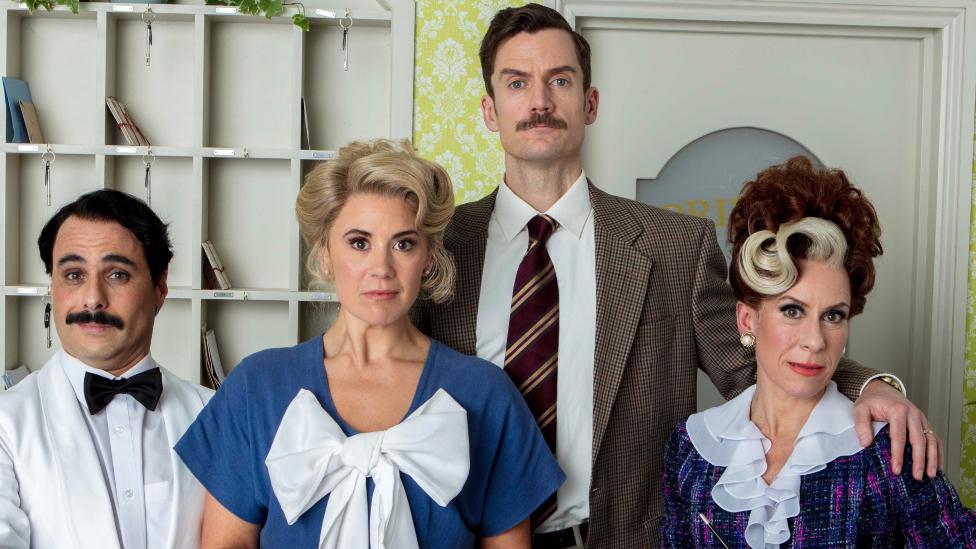Comedy doesn't work if you're literal-minded, says Cleese
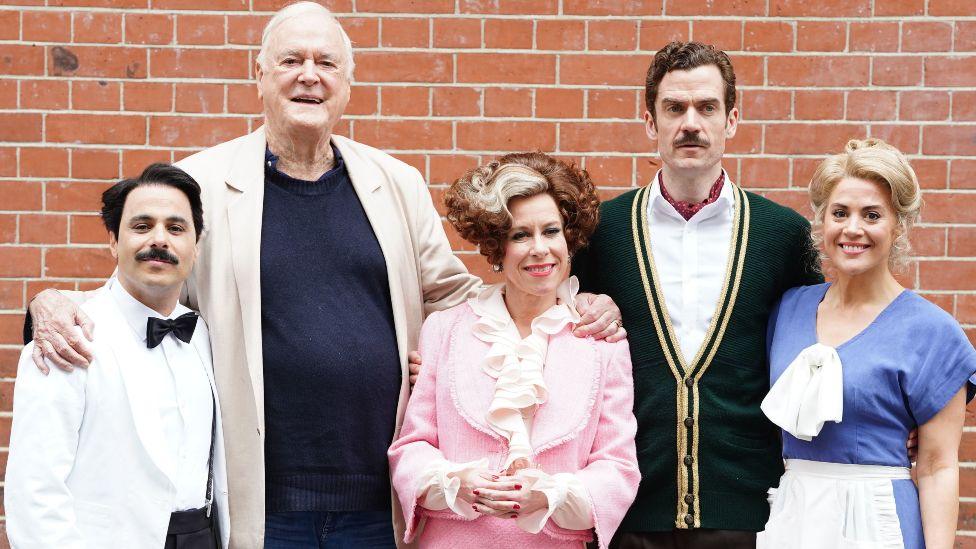
The stage adaptation of Fawlty Towers launches in London's West End on Saturday
- Published
John Cleese has said catering for "literal-minded" audience members is "always a problem" with comedy.
The writer and actor was speaking at the launch of a stage adaptation of Fawlty Towers, which is about to open in London.
Cleese acknowledged that some lines of dialogue have been removed due to changing societal expectations.
But he said comedy writing is generally more difficult because of viewers who "don't understand metaphor, irony, or comic exaggeration".
Cleese has merged three of the most popular episodes of Fawlty Towers into one over-arching narrative for the two-hour play.
They are Communication Problems, The Hotel Inspectors and the more controversial episode The Germans.
"There was a scene where the major used a couple of words you can't use now, racial slurs, so we took that out," Cleese told journalists on Thursday.
But he added that writers are also "up against" people who interpret jokes literally, sometimes not allowing for a scene's tone or set-up.
'Not playing with a full deck'
"You see, there's always a problem with comedy that you deal with the literal-minded," Cleese said.
"I remind you of Till Death Us Do Part," Cleese said, referring to the Alf Garnett, the lead character of the1960s sitcom who would regularly make highly offensive comments.
"People were roaring with laughter at him, not with him. But there were also people saying ' thank God these things are being said at last'.
"So whenever you're doing comedy, you're up against the literal-minded. And the literal-minded don't understand irony, so that means if you take them seriously, you get rid of a lot of comedy, because the literal-minded don't understand metaphor, irony, comic exaggeration.
"And the result is, if you listen to them, these are people who are not, so far as understanding what human beings are saying and doing, they're not playing with a full deck.
"Literal-minded people can only have one interpretation of what's being said. People who are not literal-minded can see there are different interpretations depending on different contexts."
His comments come four years after The Germans was temporarily removed from some streaming services and reinstated with a warning about "offensive content and language".
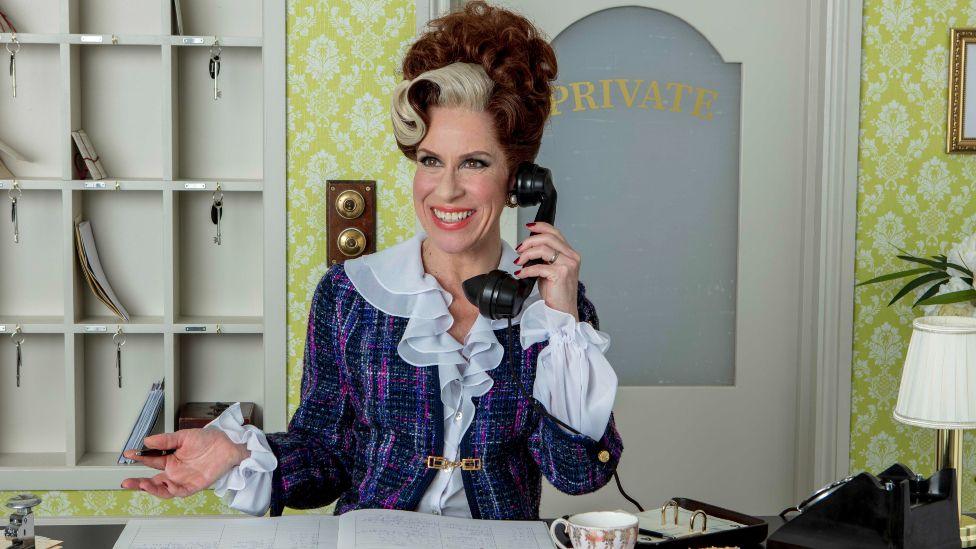
Attempts have been made to replicate the hotel's original set for the stage
The cast of the stage adaptation of Fawlty Towers performed two scenes for journalists at Thursday's press launch.
Both extracts were almost entirely faithful to their original TV scripts, with few changes made or new jokes added.
Asked by BBC News if he was worried that some of the jokes have become so famous that they might lose some of their comedic impact, Cleese noted that the stage show would evolve and change as the cast began to understand the theatre audiences and improvise new sections.
"We kept the best stuff, the best scenes, and the more [the actors] play it, the more they will invent new stuff," Cleese said.
"And when people see the show when it opens, if they came eight weeks later, they'd be very surprised at how different it is, because people react and start playing with it."
He added: "I think it will be tremendous, but it'll be tremendous in June, once [the cast] have figured out where the laughs are and exactly how to play them."
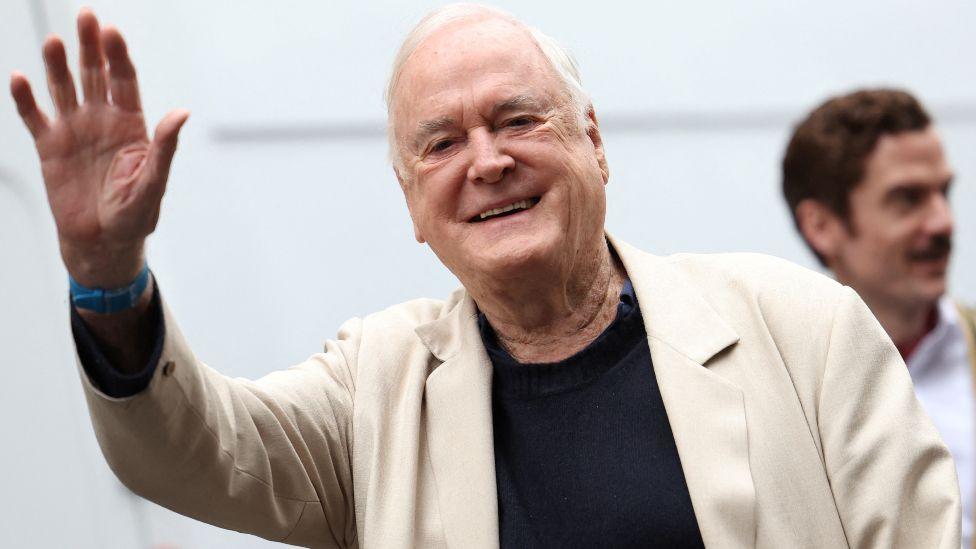
Cleese has said he hopes to write new episodes of Fawlty Towers later this year
Although some of the more contentious language has been removed, the principal characters and the physical violence Cleese sometimes directs towards them remain intact.
In the stage show, Basil (played by Adam Jackson-Fox) is seen trying to restrain a guest who starts complaining about the service in front of someone Basil suspects is a hotel inspector.
He is also seen slapping Manuel and hitting him on the head with a hard spoon, but it's clear a lot of thought has gone into staging such moves safely.
In contrast, the late Andrew Sachs, who originally played Manuel, previously recalled being physically injured, external by some of Basil's actions.
Writing in the Telegraph last week,, external Cleese defended the character of Manuel against suggestions that a useless Spanish waiter (who was being played by an English actor) was an offensive 1970s stereotype.
Cleese said: "Manuel was simply a character with whom there could be constant misunderstandings and I’ve always found misunderstandings to be very funny."
The two-hour play was previously staged in Australia, but this is the first time it has come to the West End.
Set in a fictional hotel in the seaside town of Torquay, Fawlty Towers followed an irritable hotel owner who was frequently rude to demanding guests.
In the play, Basil will be seen attempting to be unusually courteous to guests following a tip-off that inspectors may be visiting hotels in the area.
But his plans are disrupted by a party of German guests and a particularly challenging customer, Mrs Richards.
Asked how he had gone about merging the three episodes, which will bring together all three endings, Cleese said: "It's what I call carpentry.
"We chose Mrs Richards because everyone loves that, it's a wonderful character. And we chose [The Hotel Inspectors] and then of course we had to do the Germans, and then we had to figure out how we dovetail together.
"Because they start at different times and people move from one story to another. Which means that it's pretty action packed."
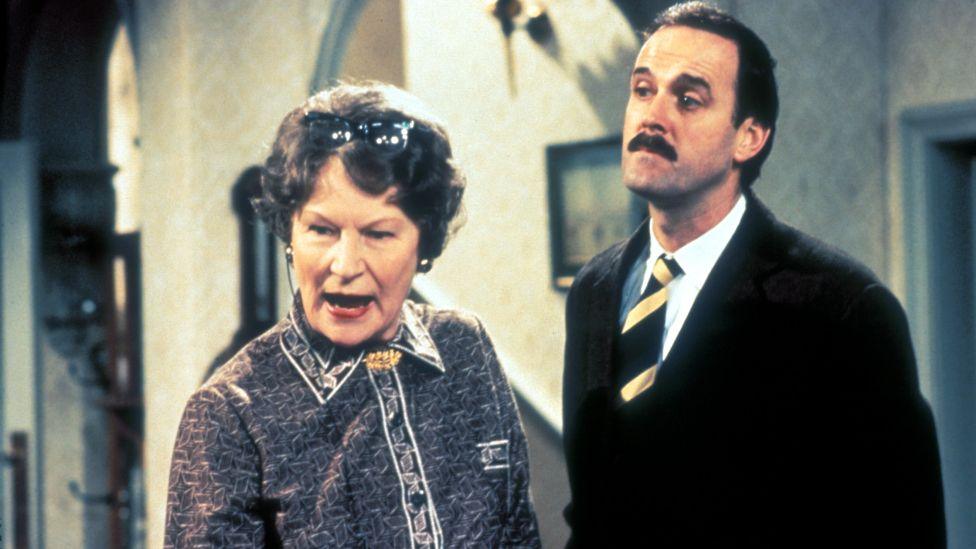
A storyline involving a demanding guest, Mrs Richards, has been included in the stage show
Cleese argues that Fawlty Towers lends itself better to a theatrical environment than television, because audiences can see everything happening on stage.
"Farce is better played in the theatre than anywhere else. Because once you're on television, then there's a guy called an editor who makes a choice about where to look.
"But in a theatre you want to sit in the middle of the stalls, not too close, and then you see all the different things that are going on at the same time."
In keeping with farcical tradition, Fawlty Towers regularly involved characters doing something in the background unnoticed by the characters in the foreground.
The show will premiere at London's Apollo Theatre on Saturday (4 May).
Cleese co-wrote the original TV series with his then-wife Connie Booth, who also starred in the series as Polly.
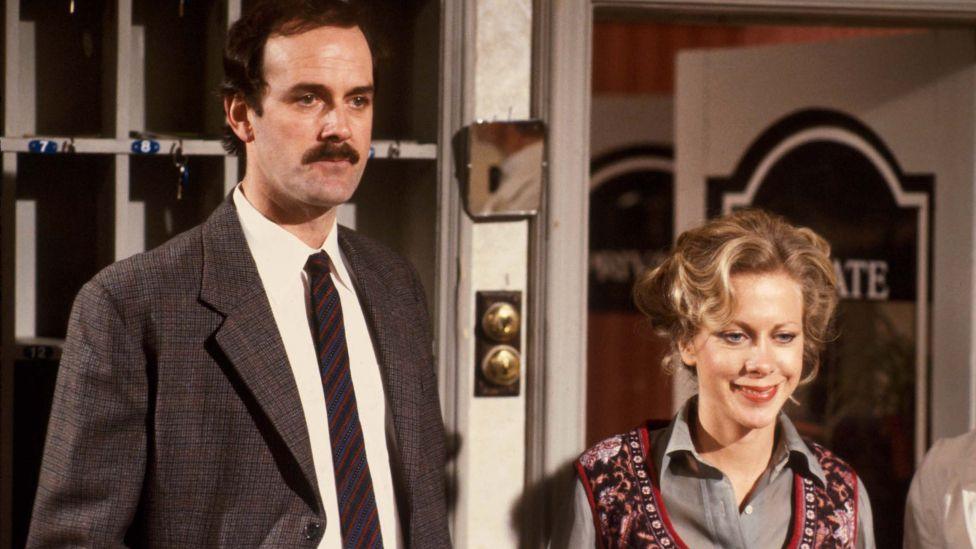
Cleese wrote the original series with his then-wife Connie Booth, who also starred in it as chambermaid Polly
Despite being considered one of the greatest sitcoms of all time, only 12 half-hour episodes of Fawlty Towers were ever produced. The first series aired in 1975, the second in 1979.
Cleese explained on Thursday: "We felt after 12 shows that we'd done the best we could possibly do, and that if we did another series people would probably say 'well it was very funny, but it wasn't as good as the first two series'. In which case why do it if you're not desperate for the money?"
The sitcom was famously based on a real-life hotel owner, Donald Sinclair. Cleese came up with the idea for the show when he stayed at Sinclair's Gleneagles Hotel in Torquay and became fascinated with his incredibly rude behaviour.
Last year, it was reported Cleese planned to write and star in new episodes alongside his daughter Camilla.
Last month, Cleese said he was hoping to return to the project later this year.
"It’s a modern update in which Basil goes out to the Caribbean where his long-lost daughter is a hotelier and wants a bit of help. But he will still be repressed and trapped. That’s his condition."
Related topics
- Published2 February 2024
